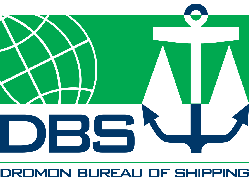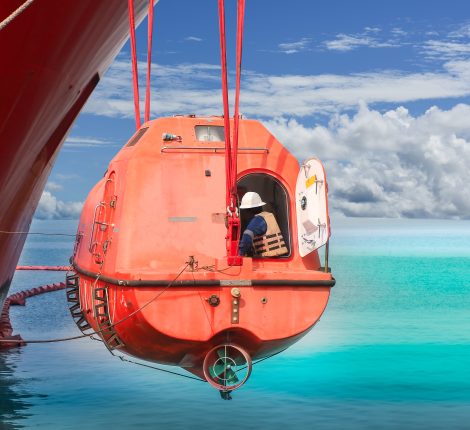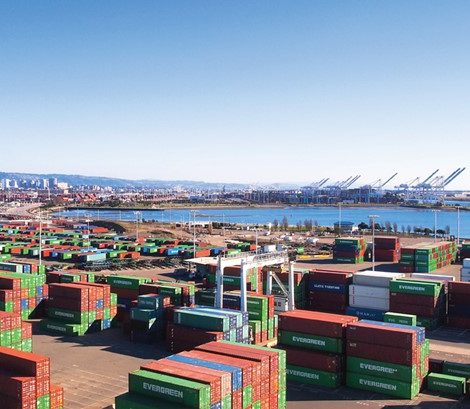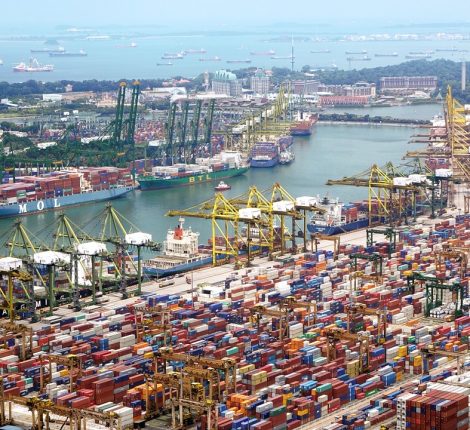- January 3, 2023
- 2022 , 2023 , Circulars
- Comments : 0
Barbados Flag State Inspections
C23001 | 20 December 2022
Notice to: Ship Owners/ Managers/ Operators / Surveyors/ Auditors/ Service Suppliers
Barbados Maritime Ship Registry issued a Bulletin 004 – Flag State Inspections. Bulleting 004
1 References
a) Barbados Merchant Shipping Act (CAP 296)
b) United Nations Convention on the Law of the Sea (UNCLOS)
c) International Safety Management (ISM) Code, adopted by IMO Resolution A.741(18)
d) IACS Procedural Requirements PR17 Reporting on deficiencies possibly affecting the implementation of the ISM Code on board
e) MLC Maritime Labour Convention, 2006
2 Purpose
2.1 This Bulletin sets out the measures for Flag State Inspections as required under sections 202 to 208 of Barbados Merchant Shipping Act (CAP 296) and Articles 94 and 217 of the United Nations Convention on the Law of the Sea (UNCLOS).
3 Application
3.1 This Bulletin applies to all Barbados registered vessels engaged in international voyages.
3.2 Pleasure (Private) yachts and unmanned barges are exempted from Flag State Inspections.
4 Flag State Inspections – General
4.1 The Flag State Inspections are to ensure that the arrangements, materials, and scantlings of the items below are in all respects satisfactory for the service for which the Barbadian vessel is intended.
4.1.1 The hull.
4.1.2 The boilers and other pressure vessels.
4.1.3 The main and auxiliary machinery.
4.1.4 The electrical installation.
4.1.5 All other equipment.
4.2 The Flag State Inspections also verify that:
4.2.1 The vessel complies with the standards of the applicable international conventions and codes.
4.2.2 The vessel is effectively managed by the company, and that the safety management system is effective and implemented properly as per the International Safety Management (ISM) Code, adopted by IMO Resolution A.741(18).
4.2.3 That Barbados national requirements, particularly those relating to the official logbook, crew articles, seafarer endorsements, and certificates, are being followed.
4.2.4 That the standard of work conducted by Recognised Organisations continues to meet the standards required by the BMSR.
4.3 The scope of the Flag State Inspections is not necessarily as the Annual, Periodic or Renewal Statutory Surveys conducted by Barbados Recognised Organisations (ROs).
4.4 Certain aspects of the inspection may be conducted by a sampling process. Therefore, the absence of deficiencies identified during the inspection does not mean deficiencies do not exist.
4.5 All Flag State Inspections can be conducted only by Barbados Appointed Nautical Inspectors (ANI), who must always contact the BMSR to request an authorisation code and specific instructions.
4.6 The BMSR has a large network of ANIs who cover all major ports, details of which can be found on the BMSR website under List of Appointed Nautical Inspections
4.7 ANIs are not restricted to a specific area or region so may inspect a vessel in any location.
4.8 The cost of an inspection is set independently by the ANI.
4.9 All costs relating to a Flag State Inspection are to be agreed between the shipowners/managers and the ANI and payment made directly to the ANI.
4.10 Failure to carry out a Flag State Inspection is considered by the BMSR as evidence of a failure of the safety management system of the vessel and company, hence as a Major Non-Conformity (MNC) under paragraphs 3 and 5 of the International Safety Management (ISM) Code, adopted by IMO Resolution A.741(18). An additional external DOC or SMS audit may be requested to address this.
5 Flag State Inspections – Documentation
5.1 On the completion of a Flag State Inspection, the ANI submits the inspection report, a list of deficiencies and/or observations to the BMSR and the Master.
5.2 On completion of both Initial Inspection and AFSI, the ANI also issues a Certificate of Inspection (CoI) with validity until the anniversary date of the vessel.
5.3 The CoI must be displayed onboard in a prominent location, typically in the accommodation or on the bridge.
5.4 Failure to display a valid CoI may result in a deficiency being raised during the next inspection.
6 Flag State Inspections – Type of Inspection
6.1 Pre-Registration Inspection
6.1.1 All vessels over 12 years of age are required to undergo a pre-registration inspection before they can be accepted for provisional registration. However, this requirement maybe waived at the Principal Registrar’ discretion.
6.1.2 No vessel can be approved for provisional registration until the pre-registration inspection report has been reviewed by the BMSR and deficiencies addressed as per the BMSR request.
6.1.3 Shipowners and managers must consider the potential of delays to the registration process should the pre-registration inspection report not be received and reviewed by the BMSR and should ensure the inspection is carried out at least 7 days before they intend to register the vessel.
6.1.4 In exceptional circumstances, the BMSR may accept a recent (within 1 month) pre-purchase inspection report in lieu of a Pre-Registration Inspection.
6.1.5 In cases where a seller does not allow additional pre-purchase survey and/or in case the vessel is at a port where a Pre-Registration Inspection cannot be undertaken, the Alternate Entry Scheme may be utilised.
6.1.6 Under the Alternate Entry Scheme, a vessel may be provisionally registered, subject to satisfactory assessment by the Principal Registrar, for a maximum period of thirty (30) days. Within this period the vessel must undergo the Pre-Registration Inspection.
6.2 Initial Inspection
6.2.1 The Initial Inspection is to be conducted within the period of provisional registration (normally 6 months).
6.2.2 The vessel can only be permanently registered once the vessel has undergone a satisfactory Initial Inspection.
6.2.3 Failure to arrange the Initial Inspection within the period of Provisional Registration may result in the vessel being refused permanent registration.
6.3 Annual Flag Safety Inspection (AFSI)
6.3.1 All vessels registered with the BMSR have an anniversary date, which is the annual anniversary of the registration date indicated on the certificate of Registry (COR).
6.3.2 The AFSI is to be conducted within the period 3 months either side of the vessel’s anniversary date.
6.4 Follow-up Inspection
6.4.1 A Follow-up Inspection might be carried out where the vessel incurs in more than 3 deficiencies or is detained during Port State Control Inspection (PSCI).
6.4.2 The scope of a Follow-up Inspection is to verify that all deficiencies have been properly rectified, and measures put in place to prevent recurrence of the deficiencies.
6.5 Additional Inspection
6.5.1 A vessel may be requested to undergo an Additional Inspection based on, but not limited to:
i) Persistent failure to rectify deficiencies by the due dates or recurrence of deficiencies;
ii) PSCIs and AFSIs;
iii) Class and Statutory Surveys;
iv) International Safety Management Code (ISM) audit(s);
v) IACS Procedural Requirements PR17 Reporting on deficiencies possibly affecting the implementation of the ISM Code on board;
vi) Information on serious defects or substandard conditions received from the BMSR Inspectors,
Recognised Organisation surveyors and auditors, other Administrations, etc.;
vii) Information received from the BMSR ANIs, PSCOs, ROs surveyors, crew members, etc., of serious breaches of the MLC Maritime Labour Convention, 2006.
6.5.2 The Additional Inspection is a one-off Flag State Inspection.
7 Special Inspection Program (SIP)
7.1 The SIP applies to those vessels where there is evidence of declining standards of operation and/or maintenance, or evidence of a significant lack of compliance with international Conventions and/or national requirements, or where a trend towards general non-compliance has been identified.
7.2 A vessel is placed automatically under the SIP when detained on more than one occasion in a 24-months period by a Port State Control Officer (PSCO).
7.3 A vessel may also be placed under the SIP based on one of the reasons listed in paragraph 6.5.1 above.
7.4 When a vessel is placed under the SIP, the shipowners/managers are to be notified by the BMSR with the reasons for the decision and with the time schedule of the SIP.
7.5 The first Special Inspection due date is one (1) month from the vessel being placed under the SIP.
7.6 The subsequent Special Inspection due dates are at three (3) month intervals thereafter.
7.7 When a vessel is under the SIP a new CoI is issued after each Special Inspection and valid for three (3) months.
7.8 The next Special Inspection is to be carried out within one (1) month before or after the due date.
7.9 After the first and any following Special Inspection if the BMSR is satisfied that the vessel has no deficiencies and proper corrective actions have been taken the vessel is removed from the SIP and will revert to the standard AFSI with the anniversary date as defined in paragraph 6.3.1 above.
7.10 If the BMSR is not satisfied with the rectification of the deficiencies and corrective actions the vessel is maintained under the SIP.
7.11 The SIP is intended to achieve satisfactory improvements within a twelve (12) month period from the date of inclusion (4 special inspections).
7.12 Where a vessel changes shipowners and/or managers while under the SIP, the vessel is meant to continue with the SIP. However, the vessel may be considered for removal from the SIP at the Principal Registrar’s discretion.
7.13 A vessel that has not addressed deficiencies and/or has not reached standards of operation and/or maintenance improvement after twelve (12) months is reviewed by the Principal Registrar and may incur on deletion from the register.
7.14 During a Special Inspection, new additional deficiencies may be raised, and it is particularly important that all deficiencies are proactively dealt with by the master and crew. Documentary evidence of this process is essential.
8 Deficiencies
8.1 The BMSR may add, remove, or amend deficiencies following a review of the Flag State Inspection reports and the list of deficiencies issued by the ANI.
8.2 All deficiencies must be closed out and evidence of rectification must be provided directly to the BMSR by email to ops@barbadosmaritime.com and by the due date given.
8.3 Acceptable evidence to close out a deficiency may include, but is not limited to:
8.3.1 Pictures.
8.3.2 Classification Society or RO survey report.
8.3.3 Certificate of maintenance.
8.3.4 Invoice or delivery notes.
8.3.5 Non-conformity reports or Corrective Action Plan (CAP).
8.4 Failure to rectify a deficiency within the due dates is considered by the BMSR as evidence of a failure of the safety management system of the vessel and company, hence as a Major Non-Conformity (MNC) under paragraphs 3 and 5 of the International Safety Management (ISM) Code, adopted by IMO Resolution A.741(18). An additional external DOC or SMS audit may be requested to address this.
8.5 Persistent failure to rectify deficiencies by the due dates or repeat occurrence of deficiencies may result
in the vessel being:
8.5.1 Required to undergo an Additional Inspection as per paragraph 6.5 above;
8.5.2 Placed under the SIP as per paragraph 7 above
8.5.3 Suspended (flag State detention);
8.5.4 Deleted from the Registry.
9 Observations
9.1 Observations give the ANI the opportunity to bring to the BMSR and shipowners/managers attention to items which are not considered deficiencies but that may be:
9.1.1 Worthy of further improvement (e.g., on board procedures, training, etc); or,
9.1.2 Worthy of praise (e.g., certain on-board working practices, maintenance levels, etc).
10 Suspension of AFSIs
10.1 When a vessel is out of service, in layup or on bareboat charter out to a Secondary Registry the requirement for AFSIs during this period may be suspended if the BMSR is advised.
10.2 When the vessel re-enters service or returns to the BMSR from bareboat charter out and in case the due AFSI has not been completed on time and is overdue by more than 3 months a new Initial
Inspection within one month of the vessel re-entering or returning is to be carried out.
10.3 In all cases the anniversary date does not change and is as defined in paragraph 6.3.1 above.
Act Now
Ship Owners/ Managers/ Operators/ Surveyors/ Auditors/ Service Suppliers should take into consideration all the above.





